Goin’ to Kansas City
Dramaturgy Open Office Hours Branches Out
In Fall 2015, Kansas City hosted a new branch of the Dramaturgy Open Office Hour Project, which originally began with Jeremy Stoller's initiative in New York City. Amanda launched the branch after hearing about the project at the Literary Managers and Dramaturgs of the Americas (LMDA) 2015 conference and chatting with Jeremy. After seeing the project’s feature in American Theatre magazine, we believed there was a need for this project in the Kansas City community.
The Kansas City theatre community is active and vibrant. We’re home to a LORT Theatre. We have a large university that offers multiple MFA theatre programs. We have a host of professional not-for-profit theatres and an overwhelming amount of smaller and community theatres, including an organization dedicated to supporting the work of local playwrights. KCFringe! provides opportunities to over 100 artists every summer. There is a show to see almost every evening throughout the year, many of which grow out of projects started here in town. While Unicorn Theatre’s mission has long been devoted to new plays, many other theatres have started offering workshops and reading series to meet the demands of local playwrights. But one missing piece we identified is an opportunity for people outside of those spaces to have conversations about their work or the theatre community. Dramaturgy Open Office Hours seemed like the perfect place to start.
Having both been employed as dramaturgs in Kansas City, we were already having conversations about dramaturgy’s role in theatre and how we could better connect ourselves and other dramaturgs to theatres and projects in the area.
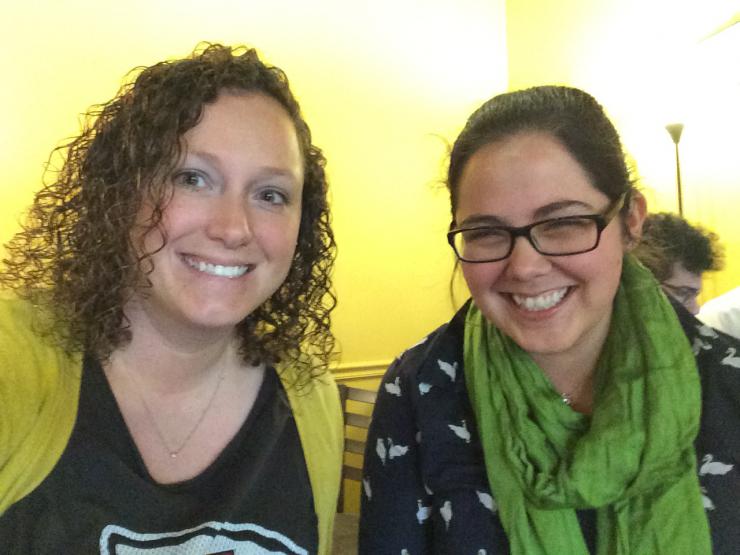
As we prepared to open the project to the public, we were unsure how the local arts community would respond. Outside of coursework at the University of Missouri-Kansas City (UMKC), dramaturgy is a profession not often utilized in the Kansas City theatre community—with the exception of the work we both do for a small group of theatres, including the Unicorn, Coterie Theatre, Kansas City Actors Theatre, and Heart of America Shakespeare Festival.
Having both been employed as dramaturgs in Kansas City, we were already having conversations about dramaturgy’s role in theatre and how we could better connect ourselves and other dramaturgs to theatres and projects in the area. Amanda invited Alyson to join the project as a co-host and the two of us began planning for a month-long project in November. After choosing dates, we reached out to a handful of local artists to be weekly guests. We specifically focused on people who, in our mind approached theatre with a dramaturgical sensibility. For us, this meant not just dramaturgs but actors, designers, directors, and producers.
What is your understanding of dramaturgy and the role of the dramaturg in the theatre?
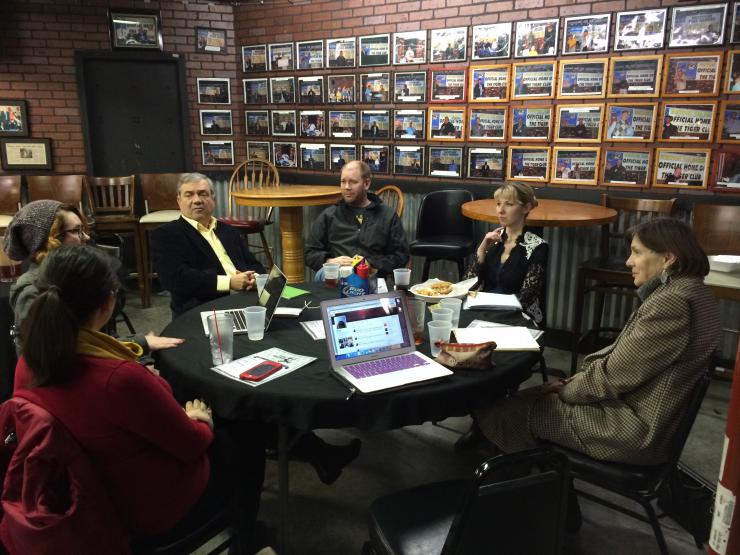
We were overwhelmed by the positive response we got from our invited guests. Our weekly guests speakers were Ian Crawford, Director, Designer, and Director of Development at the Unicorn; Marissa Wolf, Director of New Work Development at the Kansas City Repertory Theatre; Jane Barnette, Dramaturg and Assistant Professor of Theatre at The University of Kansas; and Mackenzie Goodwin Tran, Artistic Director of Westport Center for the Arts, Associate Curator of The Buffalo Room, and Commons Producer of HowlRound—all four professionals who came from different backgrounds with a range of artistic experience.
Though we weren’t sure what to expect from attendees, we hoped our invited artists would share a bit about the work they do in their various positions across the city. We also gave our guests the list of questions we planned on using each week to jumpstart conversation, the first being, “What is your understanding of dramaturgy and the role of the dramaturg in the theatre?”
For the first week, we decided we would lead the discussion without an outside guest. As working dramaturgs, we wanted to see how our community was going to respond to this opportunity. While we didn’t have expectations of a certain number or a certain type of discussion, we hoped at least one person would come share their thoughts over a cup of coffee with us. Imagine our surprise when, before we could even take a drink of our coffees, our first guest came up and introduced herself. As soon as she sat down, she cracked open the book that had sparked her newest play idea and began talking about her aspirations as a young playwright. Soon after, we were joined by three more playwrights, an actor/director/playwright, and an undergraduate theatre student with an upcoming graduation.
As each person joined us, we asked them that first question. It turned out that was the only question we needed. For three hours each week, the conversation needed no further guidance. The people who came were excited by the opportunity to talk openly about the way we tell stories, their specific projects, their frustrations, their questions, and their place within the Kansas City theatre community.
During those five weeks, we saw a range of attendees from MFA acting students to veteran professional actors, from playwriting students to produced Kansas City playwrights, and from stage managers to designers. We were joined by a local producer who will open his own theatre company this year, a local writer working on a radio play, and an undergraduate student with an interest in working as a dramaturg in Kansas City. A handful of people joined every single week, while some people only stopped by for ten minutes on their way from work to rehearsal. Everyone came hungry to talk.
Each week sparked a new conversation. One playwright was unsure where to find actors for an upcoming reading of her plays and wanted to know where to begin. We posted a call in various theatre groups for actors, and she came back the following week having cast her play, even turning some interested folks away. We provided playwrights with links to theatre submissions and festivals after discussing next steps for playwrights with drafts. We put playwrights in contact with dramaturgs to continue working on their stories. One playwright who wrote a musical recognized the importance of recording the music to send out with his submissions and soon started recording in preparation. We discussed issues of race and casting, on a national scale and in our own community. We walked through how we negotiate contracts with theatres as dramaturgs. We talked about devised theatre, and what a dramaturg’s role might be in that process. We wrestled with what it means to challenge an audience, and how we can better teach actors to engage with dramaturgs in MFA programs. Questions like "how do artists pay their rent?,” "what battles do you fight?,” "how do you create fiction out of a non-fiction text?,” and "how do you end a play?" were discussed even as we walked to our cars and looked forward to the next time we met again.
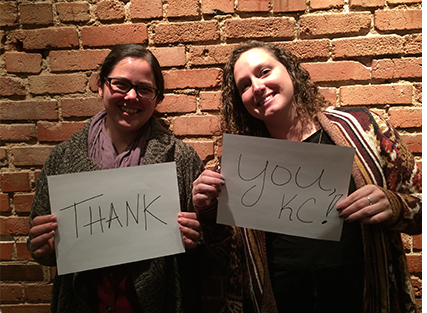
our immense gratitude for Kansas City’s support. Photo by Amanda
Boyle.
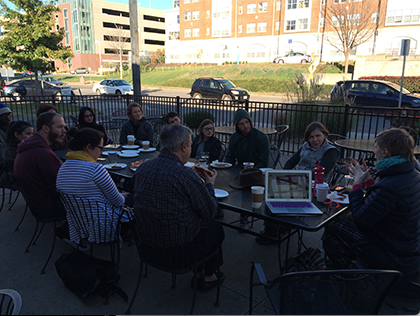
to relocate from a small, cozy coffee shop to an outdoor patio
at a pizza place down the street. Photo by Amanda Boyle.
After five weeks, we were exhausted and inspired by the talent in our community and their willingness to share their work and their fears with a group of people they had never met before. After the outpouring of positive feedback, we started a Facebook group to continue the conversation, share resources, and connect artists with one another. We hope to offer another installment of the project in Spring 2016 at the request of our participants.
Ultimately at the end of the project, we realized the desire for our community to engage with artists—including dramaturgs!—about their projects, their questions, and their ideas. Not every question asked was answered, but that meant the conversation has a reason to continue.

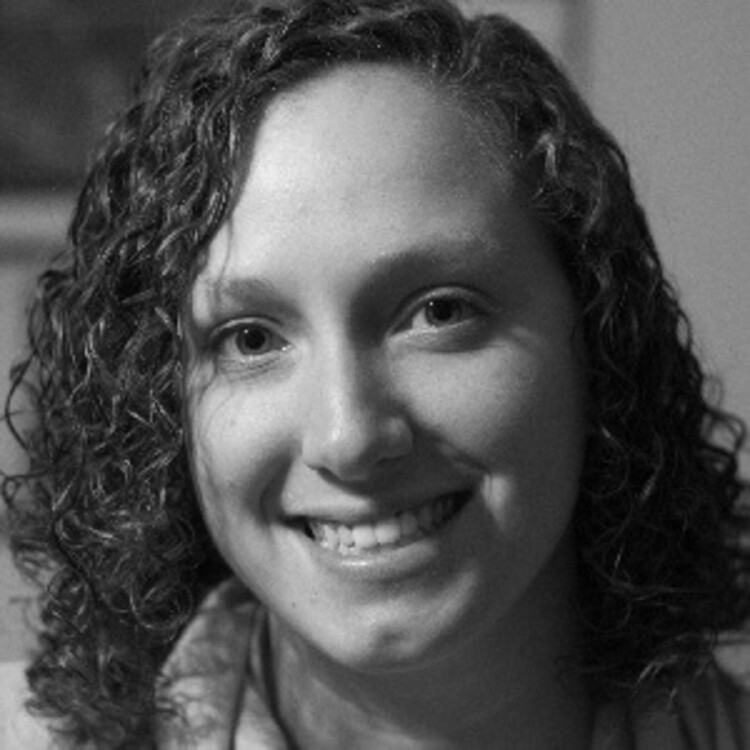
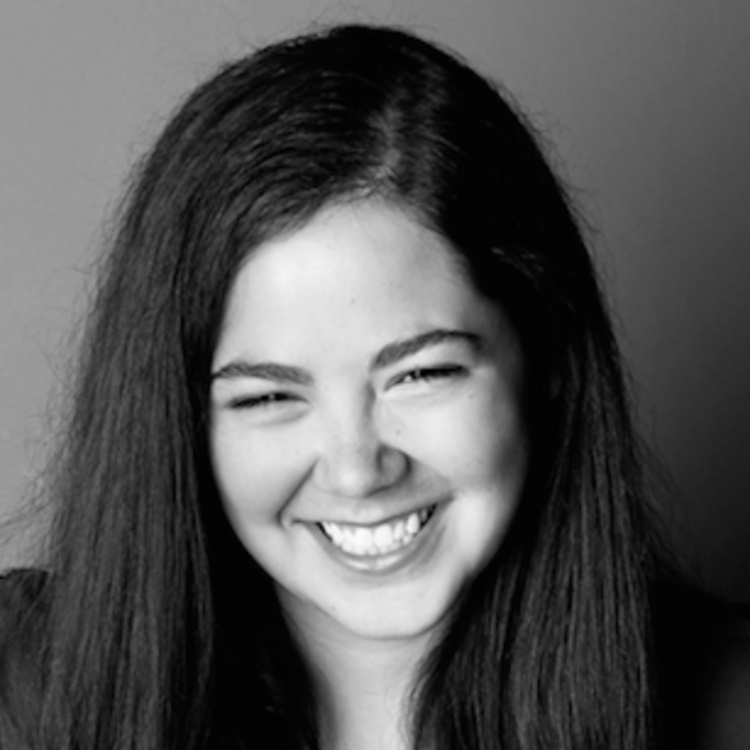
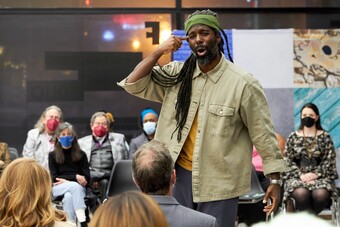




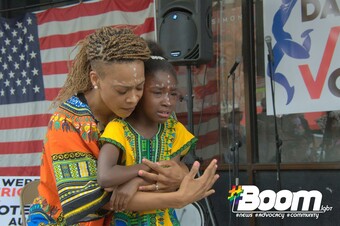


Comments
The article is just the start of the conversation—we want to know what you think about this subject, too! HowlRound is a space for knowledge-sharing, and we welcome spirited, thoughtful, and on-topic dialogue. Find our full comments policy here
I'd love to hear more about how you marketed this to your audience! It sounds like you had a great turnout.